Prayer as Protest: Reclaiming Ritual in a Time of Collapse
While spending time in Granada, I found myself inside a cathedral, guided by something subtle but clear. This piece is a reflection on that moment and what it stirred in me — a meditation on ritual, on devotion, and on how we might begin to meet the world with more tenderness. It’s an offering toward collective healing, and a remembering that even our quietest acts can carry power in the revolution.
___________________________
What if protest, as we’ve known it, shifted form? What if love — not the kind we toss around in self-help language, but grounded, deliberate, ancestral love became our collective tool, not just a private salve? What would it look like if we organized around joy even in the middle of collapse?
Every now and then, I catch glimpses of this form of resistance. People dancing in the streets. A flash of collective laughter that feels like prayer. I see these moments online. Moments where joy feels like revolution. Where something ancient and golden pulses through the screen. But just as quickly, the current shifts. Another headline. Another brutal image. Another reminder of despair. It’s like our collective nervous system doesn’t know how to hold joy without interruption. As soon as we taste a future built from pleasure, it gets flattened by the familiar weight of suffering.
And I don’t think that’s accidental. It happens too often, too precisely. We receive a transmission of life, of hope, of possibility and almost immediately, we’re met with a counter-transmission of grief. And because our bodies have been conditioned by generations of harm, we reach for the familiar signal. We align with the ache. We choose what’s recognizable: pain, loss, outrage. Not because it’s what we want, but because our cells know it. Because struggle has been our compass for so long, we start mistaking it for direction. We start confusing harm with identity. We pledge allegiance to the wound, instead of the healing.
We mistake suffering for purpose. We confuse harm with identity.
“What if protest became a kind of prayer?”
We’ve absorbed the symptoms of oppression, and of those who’ve oppressed us in ways that are making us sick.I wonder, isn't that the real tactic of our oppressors? To keep us unwell in mind, unwell in spirit, and at odds with each other?
What if protest became something else entirely? Something less reactive,and something more rooted. Yes, gather. Yes, fill the streets, but not with signs or slogans. What if we all simply come as we are. What if there was a space to cleanse one another with water that’s been prayed over, touched by herbs and soil. Clean heads. Open hearts. Clear minds. Ready to receive. Ready to listen. I’m wondering if protest become a kind of prayer, how would this altar the outcomes we are seeking? I also think about the global shadow that is facing us in this current point of time, especially the one that is hanging over the United States. This shadow we’ve tried to outrun.
That shadow is what’s made all of this grow beyond us. We’ve let it build unchecked. We’ve denied it, distanced ourselves from it, blamed it on “them.” But the truth is, we are both the oppressed and the oppressor. They are us. We are them.
If you knew you were suffering from a collective illness, deep disconnection and disassociation, what would you offer yourself? What medicine would you think that you need? Because you are. We all are in need of medicine. Do you meet your pain or illness with judgment, venom, or contempt? Or would you slow down and meet it with care? With curiosity? With something softer? We forget: this body, this world, is a shared one. No part of it is an amputation of the whole.
And when something in the body starts to shift — to contort, to move out of balance and no one notices, doesn’t the illness tend to spread?
I feel right now, the way we’ve been thinking about “healing” and “awareness” and even “enlightenment,” has grown toxic. It’s slipped into performance, projection and judgement. We have to pause and ask: are we feeding something that’s actually helping us heal, or are we feeding the very thing that’s keeping us fragmented?
In this world that’s being re-shaped everyday, what tools will we use to truly heal and foster change? Not in only dismantling what’s broken, but to build what could be?
When I see protests, I yearn for movements that rally something other than signs, perfectly curated reading lists that would make a PhD candidate tremble, soapboxes, and symbolic bombs. I dream of energy workers and lightbearers coming to the frontlines to usher in a force of faith, compassion, and hope. We need spaces forged for collective grieving and people who are transformers of energy to help sweep away our cellular pain, not more information overload or shame for not knowing all the nuances. I wonder who among us is truly holding space for all the broken parts of humanity?

I also wonder about the ways in which we individually hold ourselves back from stepping into this space of responsibility of holding space for others and helping in not just our individual journey, but that of others as well. What sources and of light are you keeping in the shadows known only to you, and hidden from the world? Bring them out. Tend to them. Strengthen them. Teach them to us. Let us witness what healing feels like, sounds like, and tastes like when it’s shared.
The only thing I feel fully equipped to do in this lifetime — and called to deepen through creating space for others is in prayer. To enact manifestive prayer through love and to get better at amplifying that vision. It is something that I have done since I was very, very young, mostly as a game with myself. I would sit and enact hours of “focused daydreaming,” alone in our backyard, as I was painfully shy and spent a lot of time alone. I did this constantly, and waited to see my prayers come to life. And they did. I had no idea that what I was doing is what we now call manifestation.
Today, as I write this, it’s Sunday, June 15th, and I’m in Granada, Spain, just a few blocks from the Cathedral de Granada. When I woke this morning, I meditated and felt a download coming through, so I began to write before the feeling could fade. Afterward, I pulled my daily oracle cards. What jumped out were “Sisterhood” and “The Art of Rituals.” Strangely enough, earlier that morning, as I packed my bag for the day, the book I chose was The Disappearance of Rituals by Byung-Chul Han.
While sitting at a local café for breakfast, I reflected on the idea of energetic protest and felt a quiet call for a year of ritual rebirth. Just then, I heard the ancient ring of patina bells echoing from the cathedral, and I followed the sound.
During my travels, I’ve developed a personal ritual of visiting sacred sites, churches, temples, mosques, wherever I land. In London, it was the Shri Swaminarayan Mandir, a Hindu temple that took me nearly two hours to reach by public transit from my uncle’s home. I chose to go that day simply because I was too tired from Berlin to do anything that required force. I needed to receive. When I arrived, the parking lot was full, and hundreds of people were pouring out of buses and cabs. I was confused but stayed the course. Later inside beneath a breathtaking, thousand-petaled lotus carved in marble, a woman beside me explained: “Today is a most auspicious day.” I had arrived on a sacred occasion. A visiting priest from India had drawn at least a thousand pilgrims to the temple. I hadn’t known. But I felt guided. Surrounded by the sounds of collective prayer and elaborately attended altars, I sat in reverence and joined in prayer. It was a blessing.
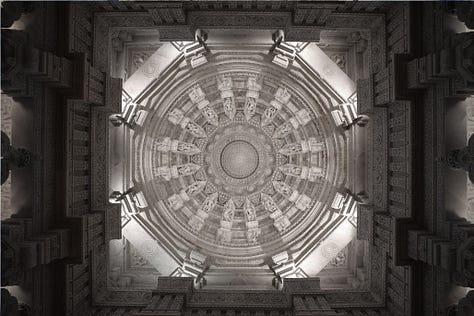
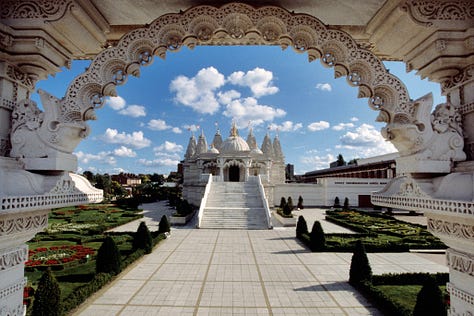
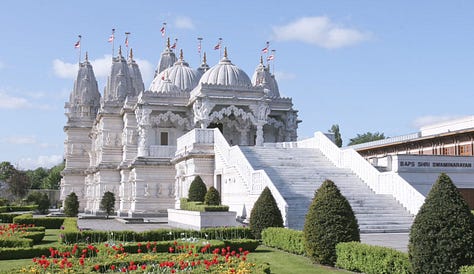
Here in Granada, I didn’t expect to have a similar experience. I just wanted to witness, and to make a quiet prayer if the mood came to me. I entered the church with a scarf to cover my shoulders and once inside, saw that a service was underway. I stood back, unsure whether to cross the velvet rope separating tourists from the faithful. The guard standing there looked very puzzled when I asked to step through to the service. I don’t blame him. I know what I must have looked like to him: a slender Black woman in espadrilles, legs visible, a thin top made barely modest by a draped shawl. But he lifted the rope.
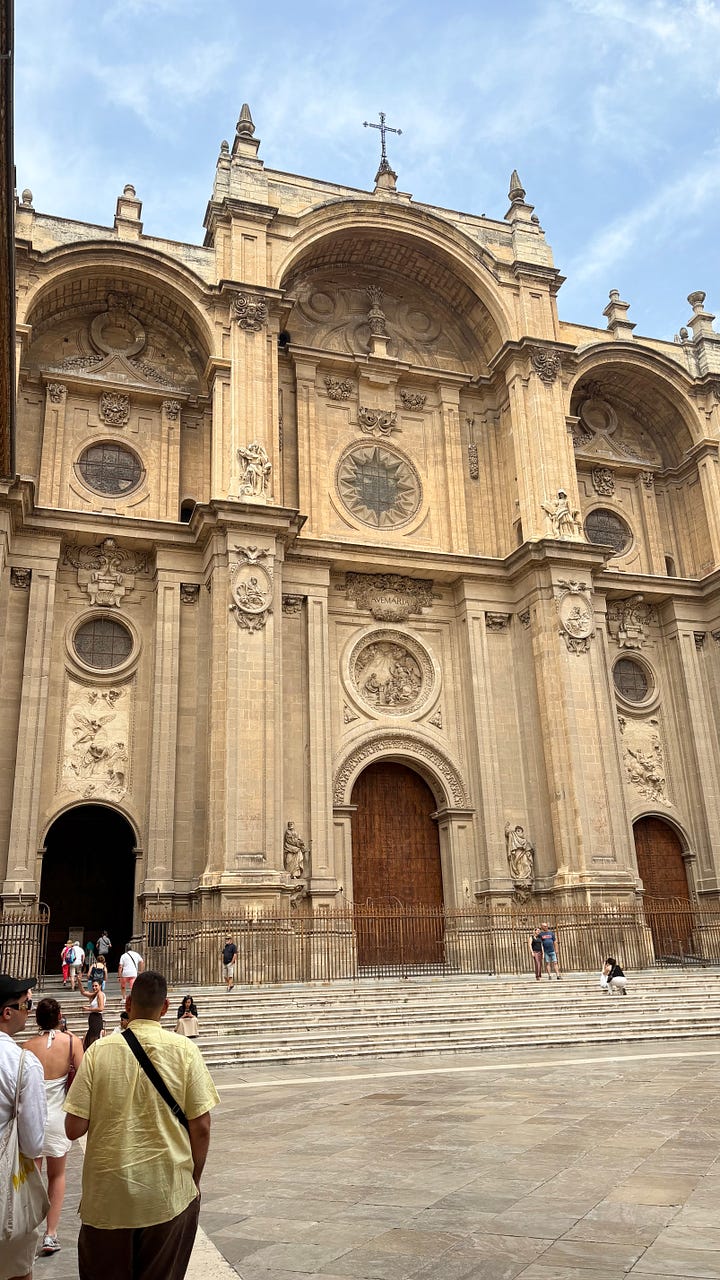


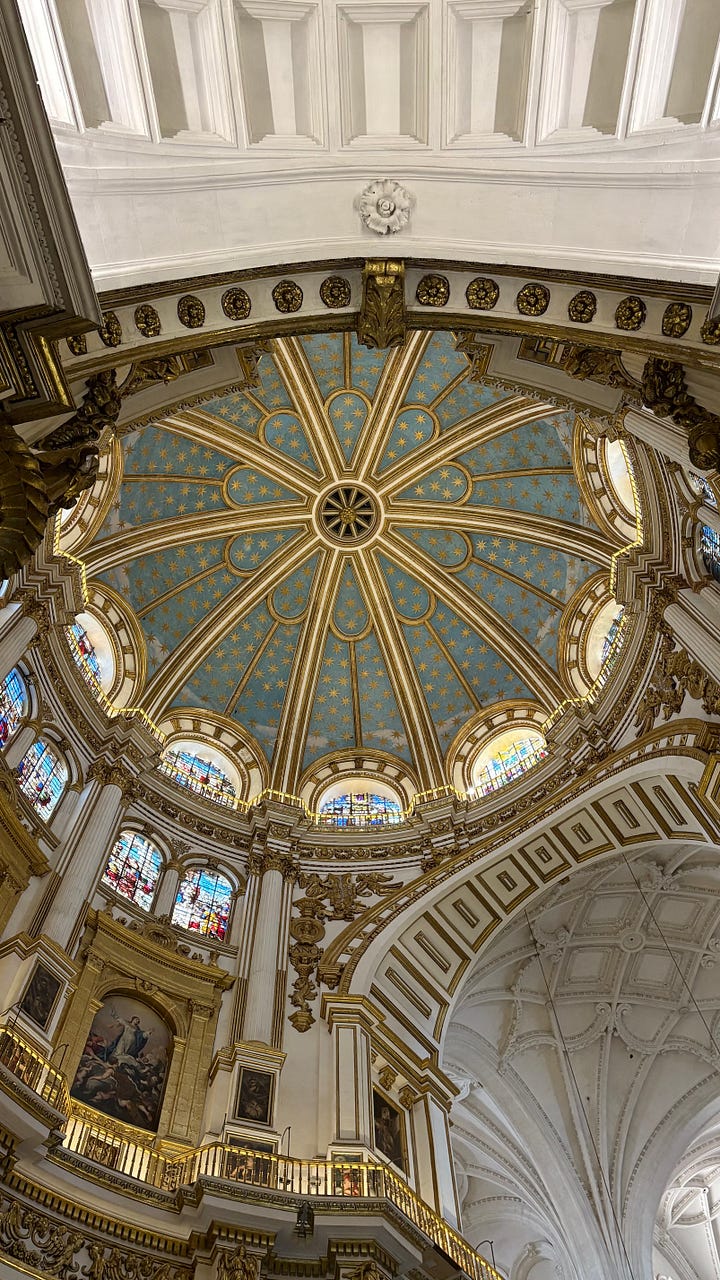
At first, I intended to sit in the back, quietly. But something in me resisted the urge to stay small. I walked deeper into the pews, closer to the center of the sanctuary. I sat and began to focus on my breath and then I prayed. Not for myself, but for us. For humanity. Whenever I place my energy fully into prayer, I’m overcome with gratitude. For the divine. For life itself. Despite everything, like the weight of injustice, and the ache of history — we still get to experience beauty, wonder, and awe in this short, miraculous blink of time called life. Hot rivers of tears came out of me. Not out of sadness alone, but from the weight of love, from the collective grief I felt moving through me. A clearing of karmic debt. I stayed in that state suspended between gratitude, remorse, and devotion for almost thirty minutes until I returned to a state of stillness, like that of an infant
For me, walking into any church or sacred space is not an endorsement of its dogma. I’m not Christian, and I don’t align with the Catholic Church. But I saw that space as an altar. An amplifier. An offering. A collective container where dozens of people had gathered to seek peace. I hoped their presence would help carry my prayer further, and that perhaps the sincerity in the room might be a vessel.
This, more than anything is what I feel equipped to offer in this lifetime: prayer through chaos, love as protest, reverence as remedy. This is my sword. My sacred work that I have to offer us.
As I stepped outside the cathedral, I sat on the stone steps to reflect on what had just moved through me, a wanderer began setting up his stage nearby, guitar in hand, his back to the wall. He began to strum “Smells Like Teen Spirit,” calling out in broken English. I walked over and dropped him a few coins as a tithe for the irony, for the medicine, for the reminder that spirit always finds a way to speak.
_________________________________________________________________________
If this reflection stirred something in you — a memory, a longing, a quiet yes — I invite you deeper into the unfolding.
Through ALT/Archives, I hold space for ritual, artistic restoration, and ancestral somatics.
One of the core vessels for this work is LUSH Praxis — a living course and ancestral system rooted in eco-somatics, earth-based ritual, and body as archive.
It’s for those called to remember who they are beyond survival… to tend to grief as sacred compost, and reclaim pleasure, prayer, and presence as tools of liberation.
🌀 To stay close to the altar:
— Subscribe to this Substack
— Explore my upcoming offering LUSH Praxis
— Follow along on Instagram
💌 P.S.
If this piece spoke to you, or it echoed something you’ve felt but haven’t had language for — I’d love to hear from you.
What rituals are sustaining you right now? What does your version of sacred protest look like?




